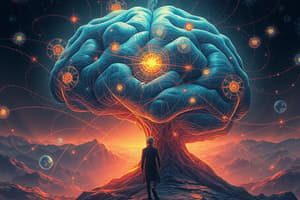Podcast
Questions and Answers
Sherlock Holmes suggested that the brain operates with a limitless capacity for memories.
Sherlock Holmes suggested that the brain operates with a limitless capacity for memories.
False (B)
The hippocampus is responsible for the storage of long-term memories.
The hippocampus is responsible for the storage of long-term memories.
False (B)
Passive oblivescence describes the active suppression of memories to maintain emotional stability.
Passive oblivescence describes the active suppression of memories to maintain emotional stability.
False (B)
Hyperthymesia allows individuals to selectively erase unwanted memories without physiological techniques.
Hyperthymesia allows individuals to selectively erase unwanted memories without physiological techniques.
Effective learning emphasizes rote memorization over understanding concepts.
Effective learning emphasizes rote memorization over understanding concepts.
Flashcards are hidden until you start studying
Study Notes
Memory Theories and Mechanisms
- Sherlock Holmes theorized that the brain functions like an attic, with limited capacity for memories, suggesting that cluttering with trivia hinders important memories.
- Memory is not limited like a computer's storage; instead, multiple memories can be encoded by the same group of neurons firing in different patterns.
- Unlike the animated representations, memories are not stored in one location but are distributed across various brain regions.
The Hippocampus and Memory Function
- The hippocampus, shaped like a seahorse, is crucial for forming new memories but does not store them.
- Patient H.M. had parts of his hippocampus removed, resulting in an inability to form new memories while retaining those formed prior to the surgery, illustrating the hippocampus's role in memory formation.
Memory Consolidation and Recall
- Memory consolidation occurs as brain cells replay experiences, strengthening connections over time, allowing for memories to shift into long-term storage.
- External triggers, like smells, can activate patterns of neurons previously fired during memory formation, leading to recall of the original experience.
Forgetting Mechanisms
- Passive oblivescence refers to memories fading over time, possibly due to weakened connections or lack of retrieval triggers.
- Targeted forgetting occurs during sleep, where the brain purges useless information and relieves conflicting memories.
- Motivated forgetting involves intentionally suppressing negative memories to maintain emotional stability and self-image.
The Importance of Forgetting
- Forgetting protects mental health by allowing individuals to move past traumatic experiences and manage emotional responses.
- The human brain has evolved mechanisms to forget to avoid cognitive overload and to update knowledge with more accurate information effectively.
Hyperthymesia and Memory Limitations
- Hyperthymesia, a rare condition, allows individuals like Jill Price to remember almost every detail of their lives, leading to vivid recall of past events but also potential distress from unresolved memories.
- The challenge of selectively erasing unwanted memories is highlighted by techniques like electroconvulsive therapy (ECT), which can indiscriminately affect memory.
Learning vs. Memorization
- Effective learning requires understanding concepts through connections and interpretation rather than just rote memorization.
- Developing critical thinking and problem-solving skills is essential for deeper learning, with resources such as Brilliant offering courses to enhance cognitive abilities.
Memory Theories and Mechanisms
- Sherlock Holmes compared the brain to an attic, implying limited capacity for memories, indicating that excess trivial data can obstruct significant memories.
- Memories are not stored in a single location; instead, they are distributed across various brain regions and encoded through unique neuronal activation patterns.
- Unlike computer storage which is finite, the brain can simultaneously store multiple memories via different firing patterns of the same neuron groups.
The Hippocampus and Memory Function
- The hippocampus, shaped like a seahorse, is essential for the formation of new memories but does not act as a storage location for these memories.
- Patient H.M. experienced memory formation loss after undergoing hippocampal surgery, demonstrating the hippcampus's critical role in new memory creation while retaining previously established memories.
Memory Consolidation and Recall
- Memory consolidation involves brain cells revisiting and replaying experiences, which solidifies connections and transitions memories into long-term storage.
- External stimuli, such as specific smells, can activate previously engaged neuronal patterns, facilitating the recall of the original memories associated with those experiences.
Forgetting Mechanisms
- Passive oblivescence describes the gradual fading of memories over time, often resulting from weakened neuronal connections or the absence of retrieval cues.
- During sleep, targeted forgetting occurs as the brain actively discards inconsequential information and resolves conflicting memories, enhancing mental clarity.
- Motivated forgetting refers to the deliberate suppression of distressing memories, aiding in emotional well-being and a stable self-image.
The Importance of Forgetting
- Forgetting serves as a protective mechanism for mental health, enabling individuals to move beyond traumatic events and better handle emotional responses.
- Evolution has equipped the human brain with forgetting mechanisms to prevent cognitive overload and to ensure the integration of updated, accurate information.
Hyperthymesia and Memory Limitations
- Hyperthymesia is an uncommon condition allowing individuals, such as Jill Price, to recall nearly every detail of their lives, which can lead to vivid recollections but may also cause emotional distress from unprocessed memories.
- Challenges in selectively erasing unwanted memories highlight the limitations of techniques like electroconvulsive therapy (ECT), which can have broad, unspecified impacts on memory.
Learning vs. Memorization
- Effective learning emphasizes the comprehension of concepts through connections and interpretations rather than simple rote memorization.
- Fostering critical thinking and problem-solving skills is crucial for deeper cognitive engagement, with platforms like Brilliant providing resources to enhance these abilities.
Studying That Suits You
Use AI to generate personalized quizzes and flashcards to suit your learning preferences.




